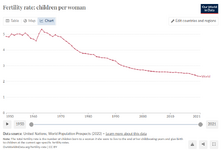Merle
Member
- Joined
- Nov 29, 2022
- Messages
- 415
- Gender
- Male
- Basic Beliefs
- Agnostic Humanist
So a figure we have little control over, multiplied by a figure we have massive control over.the detrimental human impact on the planet is equal to the number of noses times the negative impact on the planet per nose.
And you, bizarrely, conclude that we should therefore concentrate on the first of these.
Apparently due to a false belief that the second is somehow immutable.
You say it is bizarre that I would recommend reducing population, since we have little control over population. I have repeatedly told you that if we actively promoted the need to reduce population, made birth control more readily available, had programs for people in poor nation to survive their senior years without a large family, had tax policies that favored smaller families, etc. it could make a difference. It appears to me that we have a chance of women deciding to average one less child than what they have now. It would take a long time for that to make an significant effect, but if we continued for a century, we could indeed make a significant change. But you ignore all that, and make it look like I am bizarrely supported a view that I have no argument for.
You simply ignore all that, cutting out the link in my post that describes this in detail. Are you hoping that the Rubes won't notice what you just did?
If I had no reason to believe that reducing population would work, than promoting a reduction in population would be bizarre. But if you know your opponent has given you a significant argument for his case, then you should address his case, rather that hoping to impress the Rubes that your opponent is presenting bizarre opinions with no valid arguments.
But regarding your statement that I think the impact per person is immutable, why would you say that? I have repeatedly argued for nuclear power and other alternates to fossil fuels, with the understanding that this can have a significant impact. I have repeatedly argued that reducing affluence of the rich could help. You know I have argued for that. We have discussed these things numerous times. And yet somehow, bizarrely, you argue that I think these things are immutable. Unbelievable.
I think even you will agree that, even if I repeated a million times that I think we should be pursuing technological solutions, and that this would help, you would simply ignore what I say, and tell the Rubes that I am saying the opposite, yes?


